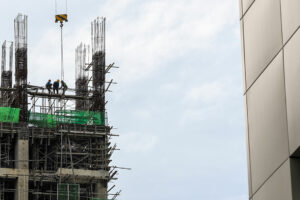THE GOVERNMENT needs to ban induction furnaces, which are incapable of consistently producing quality steel, an industry official said.
Roberto M. Cola, a member of the Department of Science and Technology’s Metals Industry Research and Development Center Governing Council, said the output of induction furnaces in the Philippines has increased since 2017.
“The main drawback of induction furnace facilities is that there is no process of removing the harmful elements in the liquid steel, thus resulting in inconsistent quality of products produced,” according to Mr. Cola, who is also a former president of the Philippine Iron and Steel Institute (PISI).
Speaking at the Kapihan sa Manila Bay on Wednesday, he said such inconsistencies in steel quality represent “a safety hazard since these steel products are used in the construction of buildings and infrastructure.”
Induction furnaces are also considered harmful to the workers and surrounding communities, as such plants generally do not have dust and emissions collecting equipment.
“Harmful gases and dust generated during scrap melting are just allowed to be emitted directly to the environment,” he said.
He said other countries have banned the technology, including China and Japan, making Association of Southeast Asian Nations (ASEAN) countries the preferred destination for obsolete and unwanted induction furnaces.
Induction furnace steelmaking capacity in the Philippines has increased to around 3 million metric tons (MT) today from less than 150,000 MT in 2017.
“These facilities are the main source of substandard reinforcing steel bars and angle bars in the market,” he said.
“They should be banned. They are banned in other countries, so we should do it because the Philippines is more at risk,” he added, noting the Philippines’ exposure to natural calamities.
PISI has reported that rebar samples taken in the first two months failed to meet industry standards for mass variation and elongation.
Meanwhile, angle bars sampled in Cavite and Cebu on Feb. 28 and March 18 also failed to meet industry standards.
PISI sent the summary of the random market test purchases of rebar and angle bars to the Department of Trade and Industry (DTI) on April 7.
“The continued high instances of non-conformity of samples purchased lead us to conclude that there are larger quantities of substandard products being sold in the market today,” PISI President Ronald C. Magsajo said in a letter to the DTI.
“We must learn from the recent tragedy that has hit our ASEAN neighbors and take the necessary steps to guarantee no such disaster occurs in our country,” he added, referring to the building collapses in Myanmar and Thailand following the Myanmar earthquake.
The group asked the DTI Fair Trade Group to impose the maximum penalties allowed by law on violators.
“Our call is for us to be stricter in our regulation and let us learn from our neighbors,” Mr. Magsajo said.
Bureau of Philippine Standards Senior Trade-Industry Development Specialist John Steven Magboo said no policy currently prohibits any manufacturing process.
“In the standards, there is nothing that specifies what manufacturing process should be adopted when manufacturing steel bars,” he said.
“So, during the audit, we do not discriminate whether they are using an induction furnace or electric arc furnace,” he added.
However, he said that the DTI is open to discussing the issue and asked for the private sector and other government agencies to help in collecting data.
“I think if there is more data available and if we can really prove that the use of an induction furnace doesn’t really produce consistent products that conform with the Philippine National Standards, I think that is the time to prohibit the use of such a process,” he added. — Justine Irish D. Tabile

